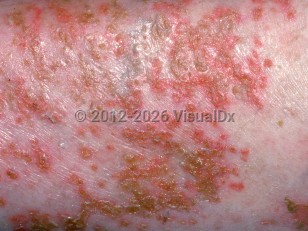Glucagonoma syndrome
Alerts and Notices
Important News & Links
Synopsis

Glucagonoma syndrome is a rare disorder caused by alpha-cell secreting pancreatic tumors that is associated with a distinctive eruption called necrolytic migratory erythema (NME). NME can be the presenting manifestation of glucagonoma syndrome in up to 70% of patients.
NME classically presents with migrating, scaly, annular, and erythematous papules, patches, and plaques with superficial necrosis leading to erosions and bullae classically located in intertriginous areas. Pruritus and burning of the skin have been reported. There is a waxing and waning course. Lesions may improve spontaneously and reappear after some months. The pathophysiology of NME is not yet understood but is likely multifactorial, involving excess glucagon and deficiency of amino acid, zinc, and free fatty acids.
Weight loss, abdominal pain, diarrhea, and fever may accompany the glucagonoma. Clinical improvement or resolution of cutaneous lesions is expected after surgical excision or surgical debulking of the pancreatic lesion. Some patients with NME have normal glucagon levels and/or absence of glucagonoma, and these cases may be associated with conditions such as inflammatory bowel disease (Crohn disease, ulcerative colitis), chronic liver disease, pancreatitis, nonpancreatic malignancies, and disorders of malabsorption.
NME classically presents with migrating, scaly, annular, and erythematous papules, patches, and plaques with superficial necrosis leading to erosions and bullae classically located in intertriginous areas. Pruritus and burning of the skin have been reported. There is a waxing and waning course. Lesions may improve spontaneously and reappear after some months. The pathophysiology of NME is not yet understood but is likely multifactorial, involving excess glucagon and deficiency of amino acid, zinc, and free fatty acids.
Weight loss, abdominal pain, diarrhea, and fever may accompany the glucagonoma. Clinical improvement or resolution of cutaneous lesions is expected after surgical excision or surgical debulking of the pancreatic lesion. Some patients with NME have normal glucagon levels and/or absence of glucagonoma, and these cases may be associated with conditions such as inflammatory bowel disease (Crohn disease, ulcerative colitis), chronic liver disease, pancreatitis, nonpancreatic malignancies, and disorders of malabsorption.
Codes
ICD10CM:
D37.8 – Neoplasm of uncertain behavior of other specified digestive organs
SNOMEDCT:
16424000 – Glucagonoma syndrome
D37.8 – Neoplasm of uncertain behavior of other specified digestive organs
SNOMEDCT:
16424000 – Glucagonoma syndrome
Look For
Subscription Required
Diagnostic Pearls
Subscription Required
Differential Diagnosis & Pitfalls

To perform a comparison, select diagnoses from the classic differential
Subscription Required
Best Tests
Subscription Required
Management Pearls
Subscription Required
Therapy
Subscription Required
References
Subscription Required
Last Reviewed:10/01/2018
Last Updated:08/06/2025
Last Updated:08/06/2025
Glucagonoma syndrome

